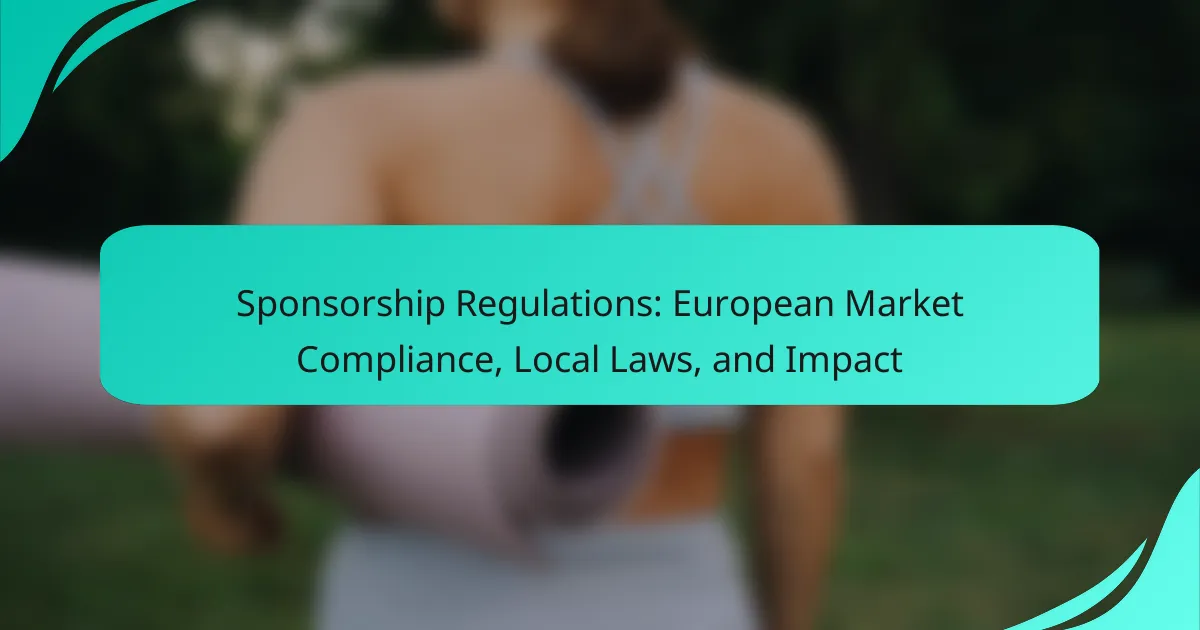Sponsorship regulations in Europe encompass a variety of laws and guidelines that govern data protection, advertising standards, and local legal frameworks. For businesses aiming to engage in sponsorship activities, understanding and adhering to these regulations is essential for maintaining legal compliance and protecting brand integrity across diverse markets.
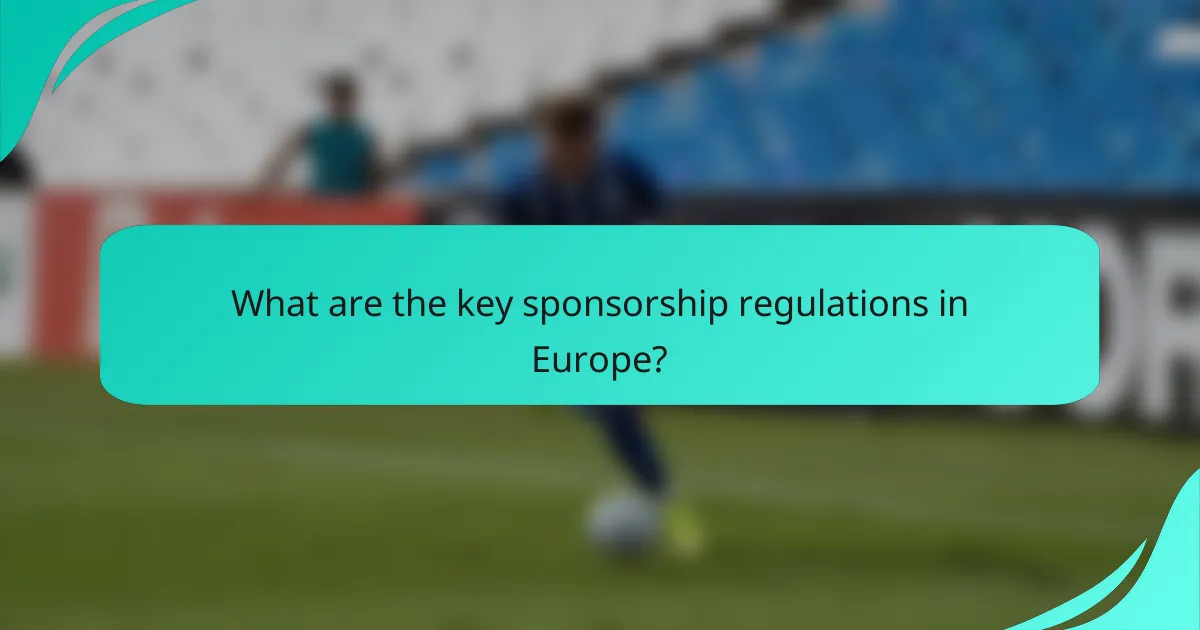
What are the key sponsorship regulations in Europe?
The key sponsorship regulations in Europe encompass a range of laws and guidelines that ensure compliance with data protection, advertising standards, and local legal frameworks. Understanding these regulations is crucial for businesses looking to engage in sponsorship activities across different European markets.
EU General Data Protection Regulation (GDPR)
The EU General Data Protection Regulation (GDPR) sets strict rules on how personal data can be collected, processed, and stored. Sponsors must ensure that any personal data obtained through sponsorship activities is handled in compliance with GDPR, which includes obtaining explicit consent from individuals.
Failure to comply with GDPR can result in significant fines, often reaching up to 4% of a company’s global annual revenue. Companies should implement clear data protection policies and regularly train staff on GDPR requirements to mitigate risks.
Advertising Standards Authority (ASA) guidelines
The Advertising Standards Authority (ASA) guidelines govern advertising practices in the UK, ensuring that all sponsorship communications are legal, decent, honest, and truthful. Sponsors must ensure that their advertisements do not mislead consumers and are clearly identifiable as marketing communications.
Adhering to ASA guidelines helps maintain consumer trust and protects brands from potential complaints or sanctions. Regularly reviewing advertising content against these standards is advisable to ensure ongoing compliance.
Local laws in Germany
In Germany, sponsorship regulations are influenced by the Telemedia Act and the Interstate Broadcasting Agreement, which require transparency in sponsorship disclosures. Sponsors must clearly indicate when content is sponsored to avoid misleading consumers.
Additionally, German law prohibits certain types of sponsorship in specific sectors, such as alcohol and gambling, especially when targeting minors. Companies should familiarize themselves with these restrictions to navigate the local legal landscape effectively.
Local laws in France
France has specific laws governing sponsorship, particularly in the areas of advertising and consumer protection. The French Consumer Code mandates that sponsorship must not mislead consumers about the nature of the sponsored content.
Sponsors must also comply with the Loi Evin, which restricts alcohol advertising and sponsorship in certain contexts. Understanding these local laws is essential for brands to avoid legal pitfalls and ensure compliance with French regulations.
Local laws in the UK
In the UK, local laws regarding sponsorship are primarily governed by the Communications Act and the Code of Non-broadcast Advertising. These laws require that sponsorship arrangements are disclosed clearly to audiences, ensuring transparency in marketing practices.
Moreover, the UK has specific regulations concerning sponsorship in sectors like gambling and alcohol, which impose additional restrictions. Brands should conduct thorough reviews of their sponsorship agreements to ensure they align with these legal requirements.
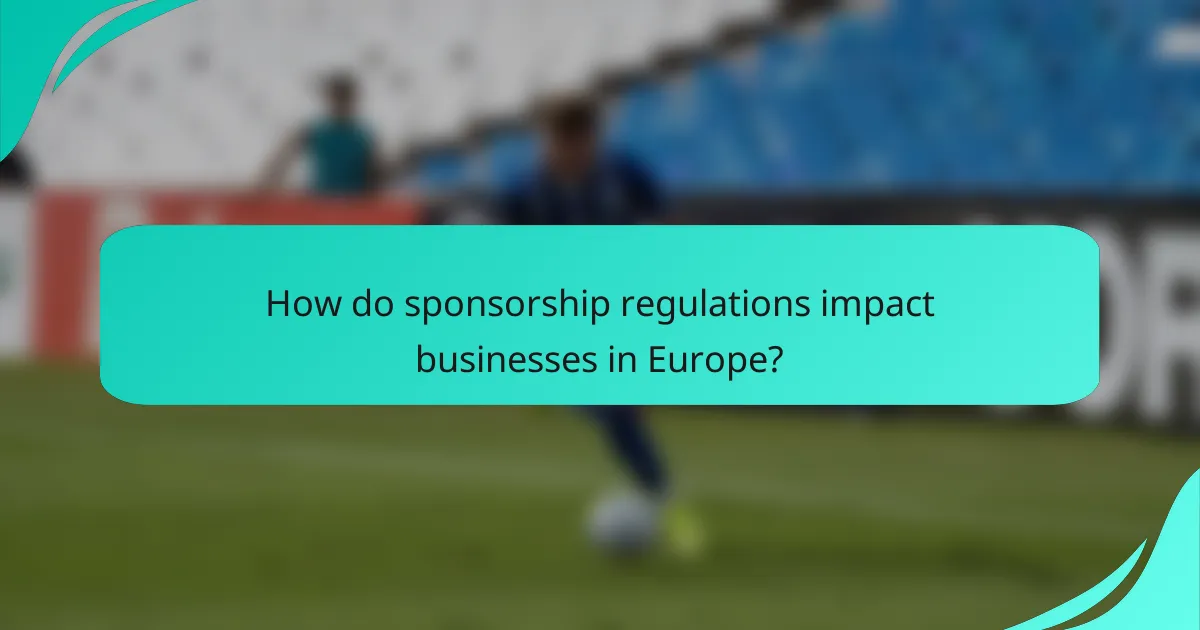
How do sponsorship regulations impact businesses in Europe?
Sponsorship regulations significantly affect businesses in Europe by dictating how companies can engage in promotional partnerships. Compliance with these regulations is crucial for maintaining legal standing and protecting brand integrity.
Compliance costs
Compliance costs can vary widely depending on the complexity of the regulations in different European countries. Companies may need to invest in legal consultations, compliance training, and monitoring systems to ensure adherence to local laws, which can lead to expenses in the low tens of thousands of euros annually.
To manage these costs, businesses should conduct a thorough risk assessment to identify specific regulatory requirements relevant to their operations. This proactive approach can help in budgeting and avoiding unexpected penalties.
Brand reputation risks
Non-compliance with sponsorship regulations can lead to significant brand reputation risks, including public backlash and loss of consumer trust. A scandal involving sponsorship missteps can result in negative media coverage, which may take years to recover from.
To mitigate these risks, companies should establish clear internal guidelines for sponsorship activities and regularly review them against current regulations. Engaging with stakeholders and maintaining transparency can also enhance brand credibility.
Market access limitations
Sponsorship regulations can impose market access limitations, particularly in industries like alcohol, tobacco, and gambling, where restrictions are more stringent. Companies may find it challenging to enter certain markets or reach specific demographics due to these regulations.
Understanding the local regulatory landscape is essential for businesses aiming to expand in Europe. Conducting market research and consulting with local experts can provide insights into navigating these limitations effectively.
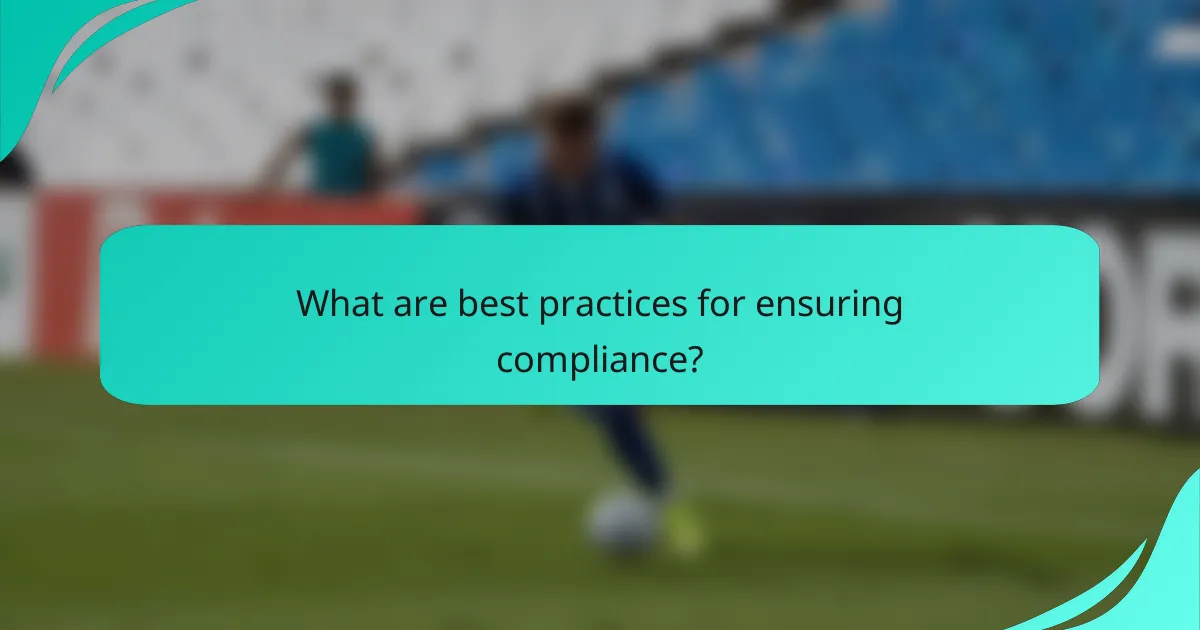
What are best practices for ensuring compliance?
To ensure compliance with sponsorship regulations in the European market, organizations should adopt a proactive approach that includes regular audits, expert consultations, and team training. These practices help mitigate risks and align with local laws effectively.
Regular legal audits
Conducting regular legal audits is essential for maintaining compliance with sponsorship regulations. These audits should assess current sponsorship agreements, promotional materials, and marketing strategies to identify any potential legal risks or violations.
Organizations should schedule audits at least annually or whenever significant changes occur in laws or business practices. This frequency allows companies to stay ahead of compliance issues and make necessary adjustments promptly.
Engaging local legal experts
Engaging local legal experts is crucial for understanding the nuances of sponsorship regulations in specific European countries. Local attorneys can provide insights into regional laws, cultural considerations, and industry standards that may impact sponsorship agreements.
When selecting legal experts, consider their experience with sponsorship compliance and familiarity with local regulations. This collaboration can help avoid costly mistakes and ensure that all marketing initiatives are legally sound.
Training for marketing teams
Training marketing teams on sponsorship regulations is vital for ensuring compliance in all promotional activities. Regular workshops or seminars can equip team members with the knowledge needed to navigate legal requirements effectively.
Focus training sessions on key topics such as advertising standards, disclosure requirements, and ethical considerations. This proactive approach not only minimizes legal risks but also fosters a culture of compliance within the organization.
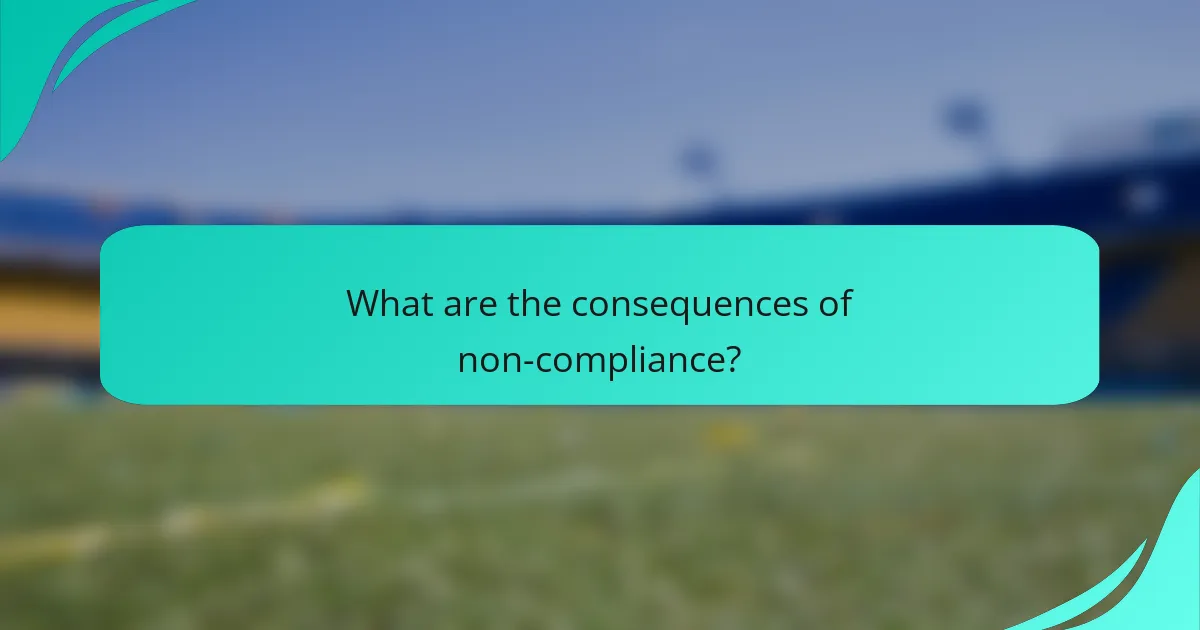
What are the consequences of non-compliance?
Non-compliance with sponsorship regulations in the European market can lead to significant repercussions, including financial penalties, legal disputes, and missed sponsorship opportunities. Organizations must adhere to local laws to avoid these adverse outcomes.
Fines and penalties
Fines for non-compliance can vary widely depending on the jurisdiction and the severity of the violation. In many European countries, penalties can range from hundreds to thousands of euros, with some cases resulting in fines reaching into the low tens of thousands. Regulatory bodies often impose these fines to enforce compliance and deter future violations.
Organizations should be aware of the specific regulations in their operating countries, as some may have stricter enforcement mechanisms than others. Regular compliance audits can help identify potential issues before they lead to financial penalties.
Legal disputes
Non-compliance can trigger legal disputes, which may arise from disagreements with sponsors, regulatory bodies, or competitors. These disputes can lead to costly litigation and damage to an organization’s reputation. Legal battles can consume significant resources, both financially and in terms of time, diverting attention from core business activities.
To mitigate the risk of legal disputes, organizations should maintain clear documentation of their sponsorship agreements and ensure they are compliant with local laws. Consulting with legal experts familiar with sponsorship regulations can also help navigate complex legal landscapes.
Loss of sponsorship opportunities
Failure to comply with sponsorship regulations can result in the loss of current and future sponsorship opportunities. Brands may hesitate to partner with organizations that have a history of non-compliance, fearing reputational damage. This loss can significantly impact an organization’s revenue and market presence.
To avoid losing sponsorship opportunities, organizations should prioritize compliance and actively engage with potential sponsors to demonstrate their commitment to adhering to regulations. Building a strong compliance track record can enhance credibility and attract more sponsorship deals in the long run.
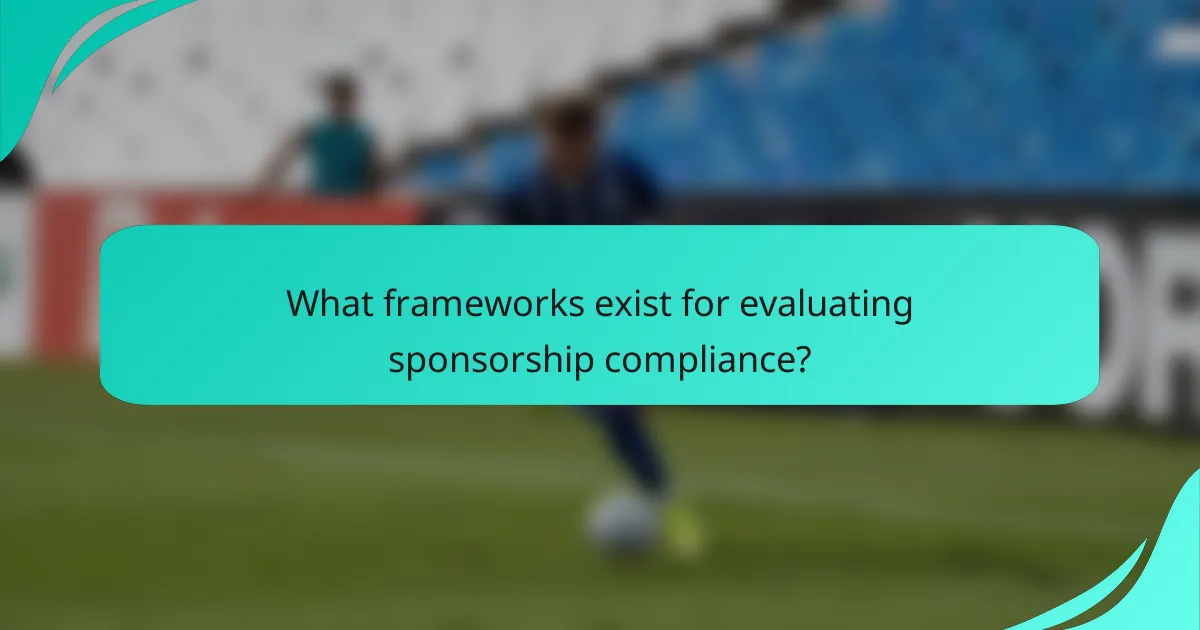
What frameworks exist for evaluating sponsorship compliance?
Evaluating sponsorship compliance involves several frameworks that help organizations navigate local laws and regulations effectively. Key frameworks include risk assessment matrices and compliance checklists, which provide structured approaches to ensure adherence to legal standards and mitigate potential risks.
Risk assessment matrices
Risk assessment matrices are tools used to identify and evaluate the potential risks associated with sponsorship activities. They typically categorize risks based on their likelihood and impact, allowing organizations to prioritize their compliance efforts. For example, a matrix might classify risks as low, medium, or high, helping teams focus on the most critical areas.
When creating a risk assessment matrix, consider factors such as the nature of the sponsorship, the target audience, and the regulatory environment. This structured approach enables organizations to visualize risks and develop strategies to address them effectively.
Compliance checklists
Compliance checklists serve as practical guides to ensure that all necessary legal and regulatory requirements are met before entering into sponsorship agreements. These checklists typically include items related to contract terms, disclosure obligations, and ethical considerations. For instance, a checklist might require verification of local advertising laws or specific sponsorship disclosures mandated by regulatory bodies.
Using compliance checklists can streamline the evaluation process, making it easier for teams to track compliance status and identify gaps. Regularly updating these checklists in response to changing regulations is crucial to maintain ongoing compliance in the dynamic European market.
